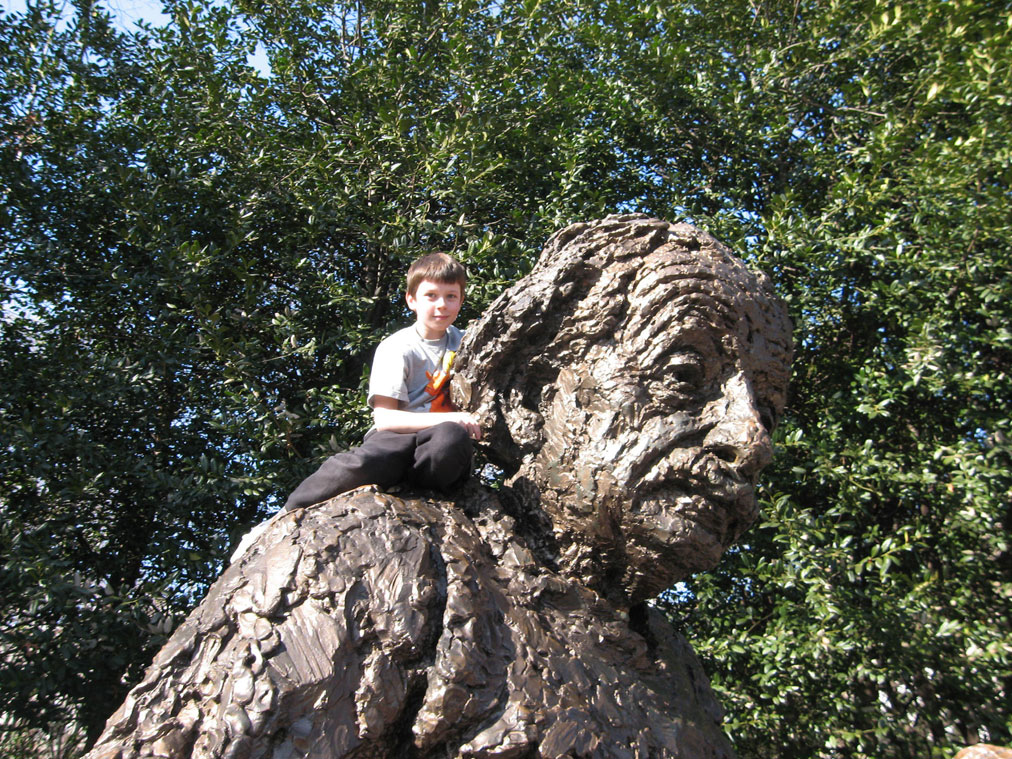Final Project
If I have seen further it is only by standing on ye shoulders of
giants.
[Isaac Newton in a Letter to Robert Hooke, dated
5 February 1675]

Einstein and Leisureguy's (Michael Han) grandson. Posted
March 23, 2007.
http://leisureguy.wordpress.com/2007/03/23/on-the-shoulders-of-giants/
Goals and Objectives:
You will research a topic related to mathematics that you are interested
in.
Create an attractive and professional historical timeline
that explores the interesting and important
breakthroughs - not the entire history.
Be sure that the timeline is in your own words and includes
important contributions from diverse scientists or mathematicians,
as
well as interesting pictures, and that the mathematical
connections are clear.
Approximate dates can be noted as ~1762 or by a range of dates, such
as 1700-1800. A maximum of two-pages will be allowed.
You may work with at most one other person
and the topic must be pre-approved as an ASULearn message to me -
topics will be assigned on a first come/first served basis.
Here is a longer
sample timeline from another class.
Your research may take the form of topics in the book that we did not cover,
further examination of something we did, or something
else related to mathematics.
I encourage you to be creative and find a topic that relates to
mathematics that you are interested in.
I am happy to give you some
suggestions of topics related to your personal interests.
Your final project will be graded based on the
depth, clarity, and creativity of the explanations and mathematics in
- your abstract (like a commercial or
advertisement for your talk) presented orally in 1-2
minutes on our last day of class
- your timeline and presentation during the final exam day. Maximum of two pages.
- peer and self-evaluations
that you will fill out that day
- an annotated reference list (to turn in).
Use many different types of sources, including scholarly references and
library sources, as well as at least one book from the library or my office.
Submit a separate annotated bibliography of all of the
sources you used in the timeline, with annotations explaining how you used
each reference in your timeline, where the pictures are originally from,
whether the source is a scholarly reference, and how you obtained the reference
(library, web, my office...)
Use
as many pages as you need for the annotated bibliography.
We will divide up the class into two research sessions.
During your session, you must stand by your timeline (which will be taped
to the wall) to
answer questions (and your answers must demonstrate expertise of your topic).
During the other session, you will talk to others about their projects and
fill out peer review sheets.
If you work on your project with someone else, you will each be in
different poster sessions.
Bring your own beverage. If you want to bring something to share, feel
free - I will provide some snacks.
References and Topic Suggestions
Books:
Catalog searches on a topic or the history of a field,
or books from the library or my office
can provide a wealth of historical information.
More general searches can also result in interesting perspectives, such as:
Library Databases:
The library database CQ Researcher presents a chronology for select topics and
questions. Library databases such as Jstor or
Academic Search Premier
can also be helpful for mathematical searches.
Websites:
Websites such as the
MacTutor History of
Mathematics archive (O'Connor and Robertson, 2005)
provide an
extensive collection of articles on particular people and topics.
The
Earliest Known Uses of
Some of the Words of Mathematics (Miller, J, 2008)
can provide history on the development as well as the first published
appearance of terms. Wikipedia's history pages and Google scholar
can also be useful.
Here are some sample broad topics related to past projects.
I suggest you skim through Heart and Mathematics
and conduct some web searches to see what peaks your interest. For your
topic, you will need to narrow it down...
Dyscalculia
Fractals and Chaos
The History of a Specific Number (Pi, Zero, the Golden Mean, Infinity...),
or Culture (Egyptian mathematics, Arabic/Islamic mathematics...).
The Mathematical Performance of the United States Compared to other Nations
Mathematics and Biology
Mathematics: Discovered or Invented
Mathematics and Economic Models
Mathematics and the Environment
Mathematics and Medical Imaging
Mathematics and Music
Mathematics and Popular Culture
Mathematics and Religion
Mathematics and Sports
Mathematics and Visualization
National Council of Teachers of Mathematics Standards for Teaching School
Mathematics
Proofs
Psychological Aspects of Mathematics
Radical Equations: Math Literacy and Civil Rights
Symmetry
